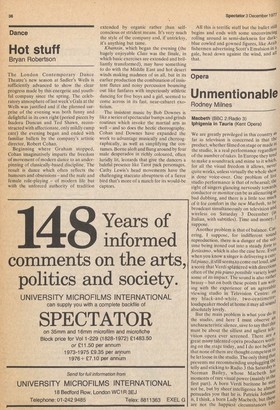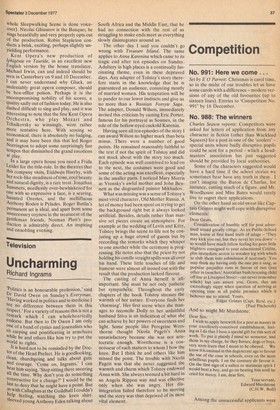Opera
Unmentionable
Rodney Milnes
Macbeth '(BBC 2/Radio 3) lphlgenia in Tauris (Kent Opera)
We are greatly privileged in this country as far as television is concerned in that the product, whether filmed on stage or made ia the studio, is a real performance regardless of the number of takes. In Europe they tend to make a soundtrack and mime to it which, for all the visual freedom it allows, neve' quite works, unless virtually the whole shoW is done voice-over. One problem of live studio performance is that of rehearsal; the sight of singers glancing nervously towardS conductor or monitor can be as alienating as bad dubbing, and there is a little too much of it for comfort in the new Macbeth, to be broadcast simultaneously on television and wireless on Saturday 3 December Italian, with subtitles). Time and moneY, I suppose. Another problem is that of balance. Cal' ering, I suppose, for indifferent sound reproduction, there is a danger of the vni" time being ironed out into a steady forte 10 fortissimo, which is also the case here. Evell when you know a singer is delivering a cafe' fulpiano, it still seems to come out loud, and a score that Verdi splattered with directions often of the pir piano possibile variety lose! some of its impact. The sound is also rathel brassy — but on both these points I am Avri!' ing with the experience of an agreeable viewing studio in TeL Centre: on le my black-and-white, two-eentimet loudspeaker model at home it may all smolt" absolutely lovely. But the main problem is what you do the studio, and here I must observe all uncharacteristic silence, save to say that this must be about the silliest and ugliest tele' vision opera ever screened. There are,:j great many talented opera producers war' ing on the stage today, and I do not believe that none of them are thought competent Wt be let loose in the studio. The only thing prevents me recommending unplugging t"... telly and sticking to Radio 3 thisSaturdaY Norman Bailey, whose Macbeth 'Ifs moments of rare visual power (mainly lilt first part). A born Verdi baritone he rna't not be, but by sheer intelligence he alr1°5„ persuades you that he is. Patricia Johns')." is, I think, a born Lady Macbeth, but 01°,5: are not the happiest circumstances (1" Whole Sleepwalking Scene is done voiceover). Nicolai Ghiaurov is the Banquo; he sings beautifully and very properly opts out of the production. Robin Stapleton conducts a brisk, exciting, perhaps slightly unyielding performance.
Kent Opera's new production of 1Phigenie en Tauride, in an excellent new English version by the house translator, Michael Irwin, can and indeed should be seen in Canterbury on 9 and 10 December. I can never understand why Gluck, an undeniably great opera composer, should be box-office poison. Perhaps it is the uncompromising nobility of his scores, a quality sadly out of fashion today. He is also dashed difficult to sing and play, and it was interesting to note that the fine Kent Opera Orchestra, who play Mozart and Tchaikovsky so winningly, were rather more tentative here. With scoring so economical, there is absolutely no fudging, and it may have been this that led Roger Norrington to adopt some surprisingly fast tempos that diminished the grand emotions at play. In a large opera house you need a Frida Leider for the title-role. In the theatres that this company visits, Eiddwen Harrhy, with her rock-like steadiness of tone, cool beauty and natural dignity, is a rare treat. Jonathan Summers, needlessly over-bewhiskered for one with so expressive a face, is a searing, haunted Orestes, and the mellifluous Anthony Roden is Pylades. Roger Butlin's Permanent set is ideal, and apart from some unnecessary coyness in the treatment of the gentleman friends, Norman Platt's production is admirably direct. An inspiring and ennobling evening.











































 Previous page
Previous page